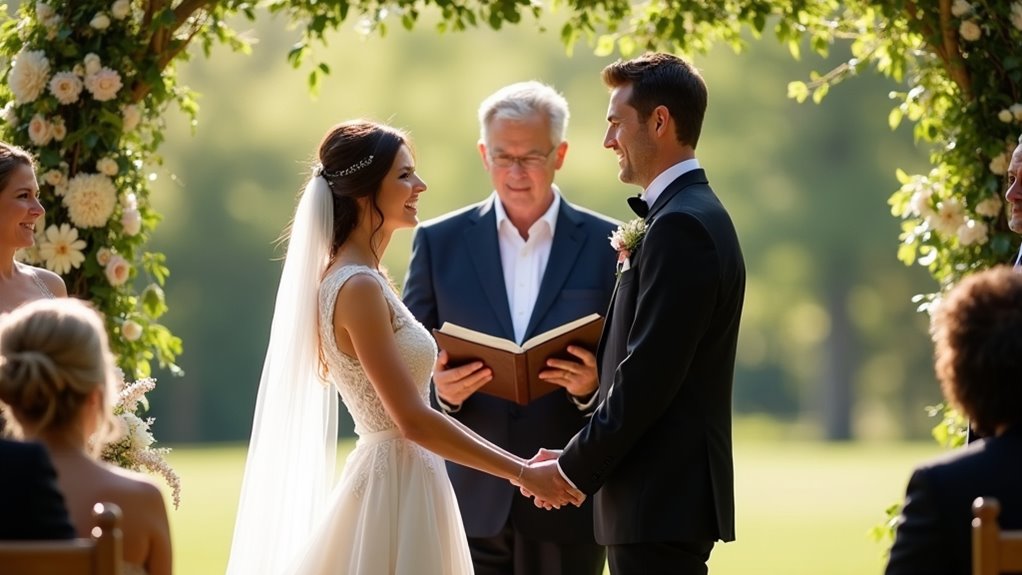Officiating a marriage is more than words spoken before a couple, it’s a sacred act, carrying both earthly and spiritual weight. Beyond documents and ceremonies, it becomes a moment where love, faith, and covenant meet.
But what truly transforms officiating a marriage from a duty into a divine calling?
Understanding legal requirements for officiating
Understanding legal requirements for officiating a marriage begins with knowing the legal jurisdiction where the ceremony takes place. In many regions, officiants must meet specific qualifications, such as registration, ordination, or license.
For those inspired by religion and spirituality, officiating a marriage often involves both sacred duty and legal responsibility. To ensure the union is recognized by both the state and the faith community, review local laws, confirm your ordination status, and complete any required filings.
Preparing for the ceremony
Before the wedding day, thoughtful preparation ensures the ceremony proceeds smoothly and meaningfully. The officiant should attend the rehearsal dinner to connect with the couple, understand their spiritual values, and learn the ceremony flow.
Reviewing venue logistics, such as seating, sound, and timing, supports coordination and a calm, faith-centered atmosphere. Understanding the schedule and key participants helps the officiant maintain order and confidence, allowing the ceremony to reflect the couple’s religion and spirituality.
With these steps, the ceremony becomes a seamless sacred experience that honors love, commitment, and spiritual intention.
Writing and personalizing the ceremony script
Creating a meaningful wedding ceremony script starts with honoring the couple’s beliefs, values, and shared path. In religion and spirituality, a personalized ceremony script can weave in sacred readings, blessings, and rituals that reflect their faith tradition or spiritual practices.
Using a clear ceremony structure ensures the flow feels natural, while thoughtful storytelling brings emotional depth. Balance classic vows or prayers with personal touches, such as a unity ritual, a favorite scripture, or a spiritual affirmation to make the ceremony authentic.
When writing the ceremony script, highlight the couple’s journey, integrate relevant spiritual themes, and guide guests through each moment with intention. A well-crafted ceremony script not only celebrates love, but also honors the sacred meaning behind the commitment.
Conducting the wedding ceremony
Conducting the wedding ceremony is a sacred responsibility that blends tradition, meaning, and connection. Once the ceremony script is prepared and personalized, the officiant steps into the role of guiding the event with calm authority and reverence, honoring the couple’s spiritual values.
Maintaining a smooth ceremony flow ensures each ritual unfolds seamlessly, from readings to vows, so the wedding ceremony feels cohesive and heartfelt. By projecting warmth and clarity, the officiant fosters guest engagement and invites everyone into the sacred moment, helping attendees feel spiritually connected.
With clear cues and thoughtful timing, the wedding ceremony remains respectful, meaningful, and aligned with the couple’s faith or spiritual path.
Handling the marriage license and documentation
Proper management of the marriage license and documentation is essential for a wedding that honors both legal requirements and spiritual intentions.
In many faith traditions, the officiant serves as both a spiritual guide and a legal witness, so it’s important to verify the marriage license is valid before the ceremony and complete all required signatures afterward.
When the marriage license and documentation are handled with care, the union is not only blessed in a religious sense but also recognized by the appropriate government office, helping couples avoid future legal complications.
Tips for creating a meaningful experience
Successfully managing the legal aspects of a marriage sets the stage for a ceremony that resonates on a spiritual and personal level.
Incorporating personal vows allows couples to express their commitment authentically, inviting a deeper sense of faith, meaning, and intention.
Additionally, embracing unique traditions, from interfaith blessings to ancestral rituals, can deepen emotional impact and reflect cultural or individual identities within religion and spirituality.
Officiants should encourage these elements to create a meaningful, memorable experience that honors the couple’s values and story, grounding the wedding in spirituality, celebrating religion with inclusion and respect, and nurturing a sacred atmosphere that supports the couple’s lifelong journey.
Conclusion
Successfully officiating a marriage requires careful attention to legal obligations, thoughtful preparation, and clear communication, especially when faith and meaning are at the heart of the day. To officiate a marriage with spiritual depth, begin by understanding the necessary requirements in your state or country, then collaborate with the couple to honor their religious or spiritual traditions. By weaving prayers, sacred readings, or mindful rituals into the ceremony, you can officiate a marriage that feels both authentic and reverent.
Craft a personalized script that reflects the couple’s beliefs, values, and love story. Offer guidance on vows, blessings, and symbolic acts, such as candle lighting, hand fasting, or scripture readings, to elevate the spiritual tone. On the day, officiate a marriage with confidence and warmth, ensuring the flow is smooth, the language is inclusive, and the documentation is properly completed. This balanced approach respects tradition while celebrating the couple’s unique path, resulting in a ceremony that is heartfelt, legally recognized, and spiritually meaningful.
Amanda Torati is a linguist and postgraduate researcher dedicated to the study of interfaith dialogue and cultural expression. With an academic background in languages, she specializes in analyzing spiritual texts and universal values to bridge the gap between ancient traditions and modern reflection. At ABPray, Amanda combines her passion for research with a mindful approach, ensuring that every article promotes harmony, respect, and deep spiritual insight for seekers of all backgrounds.






